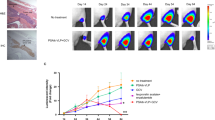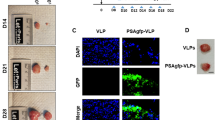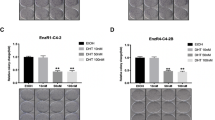Abstract
Conditionally replicating adenoviruses (CRAds) utilize tissue-specific promoters to control the expression of the early genes, E1A and E1B, to preferentially replicate and lyse tumor cells (oncolysis). Previous CRAds used in prostate cancer (PCa) gene therapy require androgens to activate prostate-specific promoters and induce viral replication. Unfortunately, these CRAds have reduced activity in patients on androgen-suppressive therapy. We describe a novel prostate-specific CRAd generated by fusing the E1A gene to the androgen receptor (AR) cDNA with a point mutation in codon 685 (C685Y). The E1A-AR fusion neutralizes the previously described mutual inhibition of E1A and AR, and the C685Y point mutation alters specificity of steroid ligand binding to the AR, such that both androgens and nonsteroidal anti-androgens can activate viral replication. We demonstrate that the mutated E1A-AR retained the ability to function in regulating AR-responsive genes and E1A-responsive viral genes. In combination therapy of virus, bicalutamide (anti-androgen) and radiation, a profound impact on cell death by viral oncolysis was seen both in vitro and tumor xenografts. To our knowledge, this is the first gene therapy engineered to be enhanced by anti-androgens and a particularly attractive adjuvant strategy for intensity-modulated radiation therapy of high-risk PCas.
This is a preview of subscription content, access via your institution
Access options
Subscribe to this journal
Receive 12 print issues and online access
$259.00 per year
only $21.58 per issue
Buy this article
- Purchase on Springer Link
- Instant access to full article PDF
Prices may be subject to local taxes which are calculated during checkout






Similar content being viewed by others
References
Petrylak DP . Chemotherapy for advanced hormone refractory prostate cancer. Urology 1999; 54: 30–35.
Petrylak DP, Tangen CM, Hussain MH, Lara PN Jr, Jones JA, Taplin ME et al. Docetaxel and estramustine compared with mitoxantrone and prednisone for advanced refractory prostate cancer. N Engl J Med 2004; 351: 1513–1520.
Kantoff P . Recent progress in management of advanced prostate cancer. Oncology 2005; 19: 631–636.
Berges RR, Vukanovic J, Epstein JI, CarMichel M, Cisek L, Johnson DE et al. Implication of cell kinetic changes during the progression of human prostatic cancer. Clin Cancer Res 1995; 1: 473–480.
Visakorpi T, Kallioniemi OP, Paronen IY, Isola JJ, Heikkinen AI, Koivula TA . Flow cytometric analysis of DNA ploidy and S-phase fraction from prostatic carcinomas: implications for prognosis and response to endocrine therapy. Br J Cancer 1991; 64: 578–582.
Spindler KR, Eng CY, Berk AJ . An adenovirus early region 1A protein is required for maximal viral DNA replication in growth-arrested human cells. J Virol 1985; 53: 742–750.
Greber UF, Willetts M, Webster P, Helenius A . Stepwise dismantling of adenovirus 2 during entry into cells. Cell 1993; 75: 477–486.
Gurnani M, Lipari P, Dell J, Shi B, Nielsen LL . Adenovirus-mediated p53 gene therapy has greater efficacy when combined with chemotherapy against human head and neck, ovarian, prostate, and breast cancer. Cancer Chemother Pharmacol 1999; 44: 143–151.
Shalev M, Kadmon D, Teh BS, Butler EB, Aguilar-Cordova E, Thompson TC et al. Suicide gene therapy toxicity after multiple and repeat injections in patients with localized prostate cancer. J Urol 2000; 163: 1747–1750.
Freytag SO, Khil M, Stricker H, Peabody J, Menon M, DePeralta-Venturina M et al. Phase I study of replication-competent adenovirus-mediated double suicide gene therapy for the treatment of locally recurrent prostate cancer. Cancer Res 2002; 62: 4968–4976.
Small EJ, Carducci MA, Burke JM, Rodriguez R, Fong L, van Ummersen L et al. A phase I trial of intravenous CG7870, a replication-selective, prostate-specific antigen-targeted oncolytic adenovirus, for the treatment of hormone-refractory, metastatic prostate cancer. Mol Ther 2006; 14: 107–117.
DeWeese TL, van der Poel H, Li S, Mikhak B, Drew R, Goemann M et al. A phase I trial of CV706, a replication-competent, PSA selective oncolytic adenovirus, for the treatment of locally recurrent prostate cancer following radiation therapy. Cancer Res 2001; 61: 7464–7472.
Hoti N, Li Y, Chen CL, Chowdhury WH, Johns DC, Xia Q et al. Androgen receptor attenuation of Ad5 replication: implications for the development of conditionally replication competent adenoviruses. Mol Ther 2007; 15: 1495–1503.
D'Amico AV, Schultz D, Loffredo M, Dugal R, Hurwitz M, Kaplan I et al. Biochemical outcome following external beam radiation therapy with or without androgen suppression therapy for clinically localized prostate cancer. JAMA 284: 1280–1283 2000.
Zapatero A, Garcia-Vicente F, Martin de Vidales C, Cruz Conde A, Ibanez Y, Fernandez I et al. Long-term results after high-dose radiotherapy and adjuvant hormones in prostate cancer: how curable is high-risk disease? Int J Radiat Oncol Biol Phys 2011; 81: 1279–1285.
Ceraline J, Erdmann E, Erbs P, Deslandres-Cruchant M, Jacqmin D, Duclos B et al. A yeast-based functional assay for the detection of the mutant androgen receptor in prostate cancer. Eur J Endocrinol 2003; 148: 99–110.
van der Poel HG, McCadden J, Verhaegh GW, Kruszewski M, Ferrer F, Schalken JA et al. A novel method for the determination of basal gene expression of tissue-specific promoters: an analysis of prostate-specific promoters. Cancer Gene Ther 2001; 8: 927–935.
Liu C, Zhang Y, Liu MM, Zhou H, Chowdhury W, Lupold SE et al. Evaluation of continuous low dose rate versus acute single high dose rate radiation combined with oncolytic viral therapy for prostate cancer. Int J Radiat Biol 2010; 86: 220–229.
Rodriguez R, Schuur ER, Lim HY, Henderson GA, Simons JW, Henderson DR . Prostate attenuated replication competent adenovirus (ARCA) CN706: a selective cytotoxic for prostate-specific antigen-positive prostate cancer cells. Cancer Res 1997; 57: 2559–2563.
Ryan CJ, Small EJ . The selection of hormonal therapy in prostate cancer: who, when, and for how long? J Natl Compr Canc Netw 2004; 2: 261–268.
Wu HC, Hsieh JT, Gleave ME, Brown NM, Pathak S, Chung LW . Derivation of androgen-independent human LNCaP prostatic cancer cell sublines: role of bone stromal cells. Int J Cancer 1994; 57: 406–412.
Reich NC, Sarnow P, Duprey E, Levine AJ . Monoclonal antibodies which recognize native and denatured forms of the adenovirus DNA-binding protein. Virology 1983; 128: 480–484.
Hoti N, Chowdhury WH, Mustafa S, Ribas J, Castanares M, Johnson T et al. Armoring CRAds with p21/Waf-1 shRNAs: the next generation of oncolytic adenoviruses. Cancer Gene Ther 2010; 17: 585–597.
Bolla M, Fourneret P, Beneyton V, Tessier A, Jover F, Verry C . [Combination of external irradiation and androgen suppression for prostate cancer: facts and questions]. Cancer Radiother 2010; 14: 510–514.
Han G, Buchanan G, Ittmann M, Harris JM, Yu X, Demayo FJ et al. Mutation of the androgen receptor causes oncogenic transformation of the prostate. Proc Natl Acad Sci USA 2005; 102: 1151–1156.
Waltering KK, Urbanucci A, Visakorpi T . Androgen receptor (AR) aberrations in castration-resistant prostate cancer. Mol Cell Endocrinol 2012; 360: 38–43.
Acknowledgements
This study was supported in part by grants from Flight Attendant Medical Research Institute (FAMRI) to Naser Uddin Hoti, and by the PCW and RO1 (R01CA121153-01A2) award to Ronald Rodriguez.
Author information
Authors and Affiliations
Corresponding author
Ethics declarations
Competing interests
The authors declare no conflict of interest.
Additional information
Supplementary Information accompanies the paper on Cancer Gene Therapy website
Supplementary information
Rights and permissions
About this article
Cite this article
Johnson, T., Höti, N., Liu, C. et al. Bicalutamide-activated oncolytic adenovirus for the adjuvant therapy of high-risk prostate cancer. Cancer Gene Ther 20, 394–402 (2013). https://doi.org/10.1038/cgt.2013.34
Received:
Accepted:
Published:
Issue Date:
DOI: https://doi.org/10.1038/cgt.2013.34
Keywords
This article is cited by
-
Oncolytic viruses—immunotherapeutics on the rise
Journal of Molecular Medicine (2016)



